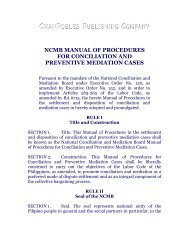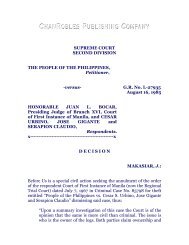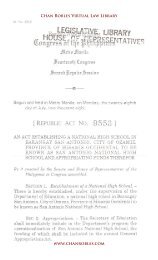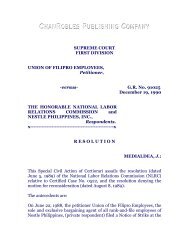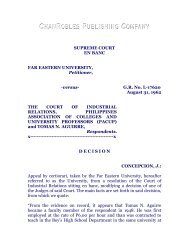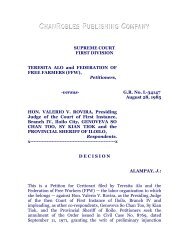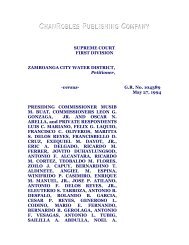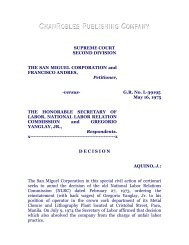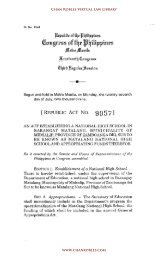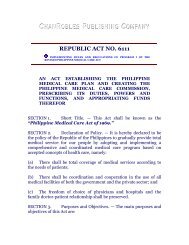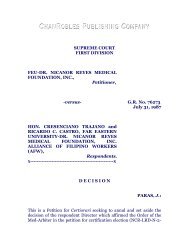part 2 - Chan Robles and Associates Law Firm
part 2 - Chan Robles and Associates Law Firm
part 2 - Chan Robles and Associates Law Firm
You also want an ePaper? Increase the reach of your titles
YUMPU automatically turns print PDFs into web optimized ePapers that Google loves.
Pre-Week Guide on Labor <strong>Law</strong> 2006 Bar Examinations Prof. Joselito Guianan <strong>Chan</strong>covenants <strong>and</strong> commitments voluntarily assumed by the Philippine government whichmust be respected. (De<strong>part</strong>ment of Foreign Affairs vs. NLRC, et al., G. R. No. 113191,September 18, 1996, 262 SCRA 39, 43-44).In 1995, the Supreme Court had occasion to assert <strong>and</strong> reiterate said rule in anillegal dismissal case filed against a specialized agency of the United Nations. Indismissing the case, the Court said that being a member of the United Nations <strong>and</strong> a <strong>part</strong>yto the Convention on the Privileges <strong>and</strong> Immunities of the Specialized Agencies of theUnited Nations, the Philippine Government adheres to the doctrine of immunity grantedto the United Nations <strong>and</strong> its specialized agencies. Both treaties have the force <strong>and</strong> effectof law. (Lasco, et al. vs. United Nations Revolving Fund for Natural ResourcesExploration [UNRFNRE], et al., G. R. Nos. 109095-109107, February 29, 1995; WorldHealth Organization vs. Aquino, 48 SCRA 242 [1972]).There is an exception to the immunity rule as exemplified by the case of UnitedStates vs. Hon. Rodrigo, [G. R. No. 79470, Feb. 26, 1990, 182 SCRA 644, 660]. Here, itwas held that when the function of the foreign entity otherwise immune from suit,<strong>part</strong>akes of the nature of a proprietary activity, such as the restaurant services offered atJohn Hay Air Station undertaken by the United States Government as a commercialactivity for profit <strong>and</strong> not in its governmental capacity, the case for illegal dismissal filedby a Filipino cook working therein is well within the jurisdiction of Philippine courts.The reason is that by entering into the employment contract with the cook in thedischarge of its proprietary functions, it impliedly divested itself of its sovereignimmunity from suit.d. JURISDICTION OVER LOCAL WATER DISTRICTS. - In Hagonoy Water Districtvs. NLRC, [G. R. No. 81490, August 31, 1988], the Supreme Court ruled that local waterdistricts are quasi-public corporations <strong>and</strong>, therefore, the dismissal of their employees aregoverned by the civil service laws, rules <strong>and</strong> regulations. (See also Tanjay Water Districtvs. Gabaton, G. R. No. 63742, April 17, 1989).However, although the Labor Arbiter has no jurisdiction, the Supreme Court, inZamboanga City Water District vs. Buat, [G. R. No. 104389, May 27, 1994], did notallow petitioner to belatedly raise the issue of jurisdiction before it, considering that itnever raised said issue before the Executive Labor Arbiter, the NLRC or even before theSupreme Court in another related case. In fact, it was petitioner itself which filed thecomplaint before the Executive Labor Arbiter <strong>and</strong> sought affirmative relief therefrom <strong>and</strong><strong>part</strong>icipated actively in the proceedings therein. Although jurisdiction over strikes <strong>and</strong>dismissals of employees in local water districts is lodged not with the NLRC but with theCivil Service Commission, here, the petitioner is already estopped from assailing thejurisdiction of the NLRC <strong>and</strong> is, therefore, bound to respect all the proceedings therein.e. JURISDICTION OVER TORTS. - As earlier emphasized, Labor Arbiters <strong>and</strong> the NLRChave no power or authority to grant reliefs from claims that do not arise from employeremployeerelations. They have no jurisdiction over quasi-delict or tort per Article 2176of the Civil Code that have no reasonable causal connection to any of the claims providedfor in the Labor Code, other labor statutes, or collective bargaining agreements.In Tolosa vs. NLRC, [G. R. No. 149578, April 10, 2003], a complaint waslodged with the Labor Arbiter but later, the Supreme Court ruled that the Labor Arbiterhas no jurisdiction over the case because it was established that the same was in thenature of an action based on a quasi-delict or tort, it being evident that the issue presentedtherein involved the alleged gross negligence of the co-employees (shipmates) of CaptainTolosa, the deceased husb<strong>and</strong> of the complainant, with whom Captain Tolosa had noemployer-employee relationship.SUMMARY OF OTHER ISSUES BEYOND JURISDICTION OF THELABOR ARBITERS OR NLRC.In addition to the foregoing, other issues over which the Labor Arbiter or NLRChas no jurisdiction may be summed up as follows:6


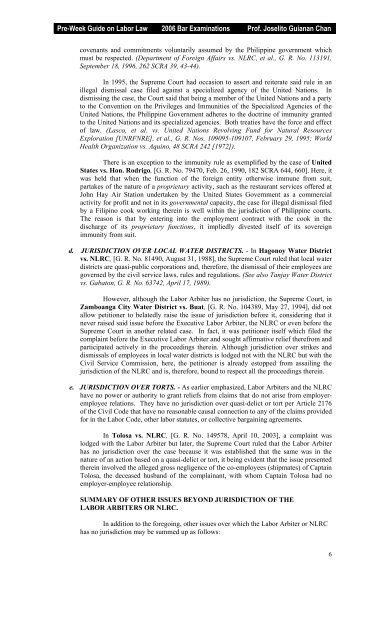
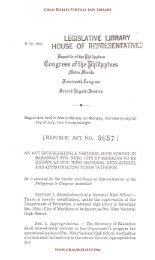
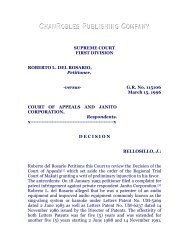
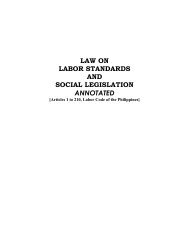
![Aurelio vs. NLRC, (221 SCRA 432 [1993]) - Chan Robles and ...](https://img.yumpu.com/51280528/1/190x245/aurelio-vs-nlrc-221-scra-432-1993-chan-robles-and-.jpg?quality=85)
